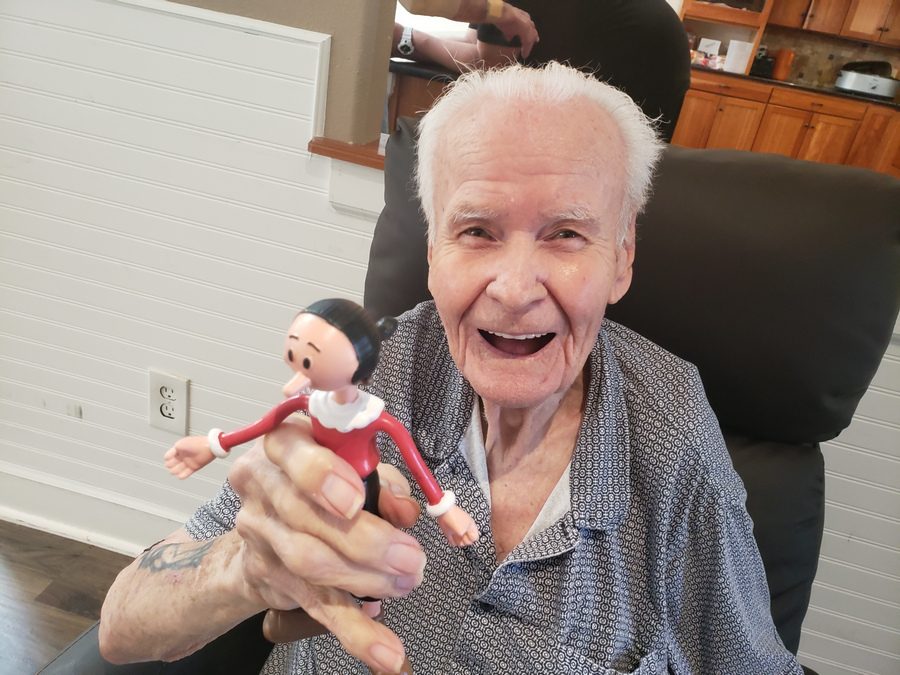Exploring the Significance of Memory Treatment Provider in Small Memory Treatment Residences
Memory care services play an essential duty in enhancing the lives of people with cognitive disabilities. In small memory care homes, the emphasis shifts to personalized treatment tailored to every resident's one-of-a-kind requirements. These intimate setups cultivate deeper connections and a supportive community. The inquiry continues to be: how do these environments especially contribute to the emotional well-being of both homeowners and their families? Comprehending this dynamic reveals the true value of specialized memory treatment.
Comprehending Memory Care and Its Importance
Memory care is an important element in addressing the distinct needs of individuals with cognitive disabilities, such as mental deterioration and Alzheimer's illness. This specialized kind of care concentrates on producing a encouraging and secure atmosphere tailored to the obstacles encountered by these people. Memory care centers employ trained personnel who understand the complexities of cognitive decrease, using personalized care that advertises dignity and respect.Activities and routines are designed to promote memory retention and cognitive feature while ensuring safety and security and safety and security. Furthermore, memory care highlights social communication, which can alleviate sensations of seclusion and enhance emotional well-being. By promoting an organized atmosphere, individuals can browse their day-to-days live with even more self-confidence. Understanding the relevance of memory care discloses its duty in improving quality of life, enabling people to maintain as much self-reliance as feasible while receiving the support they require.

The Benefits of Smaller Sized Memory Care Houses
Smaller sized memory treatment homes supply a more intimate setting that can significantly boost the quality of take care of citizens. With fewer residents, employee can develop stronger connections, promoting trust fund and psychological links. This individualized attention often results in boosted interaction, making it simpler for caregivers to understand and satisfy the one-of-a-kind requirements of each local. Additionally, smaller atmospheres generally reduce stress factors and distractions, promoting a soothing ambience for memory retention and emotional health. The format of smaller homes often motivates socialization amongst residents, enabling meaningful communications that can battle sensations of isolation. Moreover, these homes can adapt a lot more swiftly to adjustments in care requirements, guaranteeing that locals receive timely support. Overall, the individualized interest, lowered tension, and boosted social opportunities found in smaller sized memory treatment homes create a nurturing environment that supports both cognitive feature and emotional wellness
Personalized Care Program for Individual Needs
Customized treatment strategies are important in dealing with the special demands of people in memory care. These strategies often include tailored assistance strategies that enhance daily living and promote health. In addition, individualized activity interaction helps homeowners link with their interests, cultivating a sense of function and pleasure.
Tailored Assistance Techniques
Recognizing the unique requirements of each individual is fundamental when developing tailored assistance techniques in memory treatment solutions. These approaches entail producing personalized treatment strategies that satisfy the particular demands, choices, and capacities of locals. By examining cognitive feature, psychological wellness, and physical wellness, caregivers can develop reliable treatments that promote comfort and freedom - small memory carehomes Charlotte. This individualized method warranties that each homeowner gets proper assistance, improving their quality of life. Routine examinations and adjustments to these plans are necessary, as they permit caretakers to respond proactively to altering requirements. Additionally, engaging family members in the planning process fosters a collective atmosphere, strengthening the assistance network for individuals with memory challenges. Ultimately, tailored assistance strategies are important for supplying compassionate and effective memory care
Embellished Task Interaction
Creating purposeful involvement through customized activities is crucial in memory care solutions. Memory treatment homes prioritize individualized treatment strategies that cater to the unique demands and choices of each homeowner. These strategies often include tasks tailored to residents' interests, capacities, and cognitive degrees, boosting their feeling of function and self-respect. By integrating familiar regimens, leisure activities, and social communications, caregivers can boost cognitive feature and psychological wellness. Individualized task engagement not just fosters an encouraging environment but also encourages citizens to preserve their freedom. The energetic engagement in these tailored activities can cause enhanced mood and minimized anxiousness, enhancing the relevance of an all natural method in memory care that recognizes each person's trip and special experiences.
Producing a Supportive Neighborhood Environment
While promoting a helpful area environment is important for those with memory care requirements, it requires intentional design and thoughtful interaction. Developing such their explanation an atmosphere includes a combination of physical area and interpersonal connections. Tiny memory treatment homes can profit significantly from designs that encourage social interaction, such as open usual locations and comfortable event areas. These layouts promote a feeling of belonging and safety and security for residents.Moreover, staff members play a crucial function in cultivating this setting. Training caretakers to prioritize empathy and active listening enhances relationships and fosters trust. In addition, including families in treatment plans and area tasks can strengthen bonds and produce a network of support.
Enhancing Social Engagement and Activities
Effective social interaction and activities are crucial for improving the health of homeowners in memory treatment homes. These interactions not only promote a feeling of belonging however also stimulate cognitive features, which can positively affect memory retention. Small memory treatment homes commonly supply individualized programs tailored to the special rate of interests and abilities of each local, allowing for even more significant and reliable engagement.Activities such as art treatment, music sessions, and group video games encourage locals go now to attach with each other, promoting friendships and reducing feelings of seclusion. Additionally, including outdoor activities, such as gardening or nature strolls, can enhance state of mind and general health.These enriching experiences aid homeowners keep a feeling of objective and happiness in their lives. By developing an atmosphere that focuses on social communication, small memory treatment homes substantially add to the psychological and psychological health of their citizens, ensuring they feel valued and sustained in their trip.
Supporting Households Through the Trip
As family members navigate the difficulties of caring for a loved one with memory impairment, the support offered by tiny memory treatment homes becomes crucial. small memory carehomes Charlotte. These homes provide not only specific care for citizens yet additionally valuable sources for families. By fostering a joint setting, small memory care homes motivate open interaction, permitting households to share concerns and share experiences.Support teams and educational workshops are commonly readily available, gearing up families with understanding and methods to handle the complexities of memory loss. Such efforts help minimize sensations of seclusion, as households get in touch with others facing comparable situations.Moreover, small memory treatment homes usually give customized updates on homeowners' well-being, alleviating family members' worries and helping them really feel associated with their loved one's life. This holistic strategy to support not only improves the top quality of take care of homeowners but additionally equips families throughout their psychological trip
The Impact of Specialized Personnel Educating on Treatment Top Quality
In small memory treatment homes, the quality of care is greatly affected by the training and competence of the personnel. Specialized training outfits caregivers with crucial skills to recognize and address the special needs of residents with memory impairments. Expertise of dementia-related behaviors, effective communication strategies, and person-centered care techniques boosts the ability of staff to develop a supportive environment.Moreover, skilled staff are better prepared to take care of challenging situations, reducing the chance of disputes and ensuring a calmer atmosphere. This training cultivates a deeper emotional connection between locals and caregivers, advertising depend on and improving total wellness. Furthermore, specialized training can lead to greater job complete satisfaction amongst caretakers, minimizing turn over prices and supplying continuity of care for residents. Inevitably, the financial investment in staff education and learning noticeably boosts the standard of care, which is important for enhancing the lifestyle for people in tiny memory treatment homes.

Regularly Asked Questions
Just how Do I Choose the Right Memory Treatment Home for My Loved One?
Picking the appropriate memory care home involves reviewing individual requirements, visiting centers, reviewing team experience, understanding treatment options, taking into consideration area, comparing costs, and seeking recommendations. Each factor plays an essential role in guaranteeing optimal care.
What Is the Expense Difference In Between Huge and tiny Memory Treatment Facilities?
The price difference in between tiny and large memory care facilities can vary considerably. Generally, little homes might provide more individualized treatment click here for more at a higher per-person rate, while bigger facilities usually supply a lot more services at a reduced general expense.
Exactly How Commonly Can Households Go To Their Liked Ones in Memory Treatment Houses?
Family members can usually see their loved ones in memory care homes as typically as desired, with many facilities urging routine sees to preserve links and assistance psychological well-being, though certain policies may differ by home.
What Specific Tasks Are Provided in Little Memory Care Houses?
Little memory treatment homes normally supply tasks like arts and crafts, songs therapy, horticulture, exercise courses, and cognitive video games. These activities are developed to engage citizens, promote their minds, and advertise social interaction amongst them.
Are There Any Age Limitations for Homeowners in Memory Treatment Facilities?
Age constraints for residents in memory treatment centers typically differ by location and private center plans. Generally, these homes provide to older grownups, typically requiring homeowners to be a minimum of 55 or 60 years old. In tiny memory treatment homes, the focus changes to individualized care tailored to each local's special requirements. Memory care facilities utilize qualified team that comprehend the complexities of cognitive decrease, supplying individualized care that promotes self-respect and routines and respect.activities are developed to promote memory retention and cognitive feature while guaranteeing security and protection. Smaller sized memory treatment homes use a more intimate setting that can noticeably improve the top quality of treatment for citizens. Memory care homes prioritize individualized treatment strategies that cater to the special demands and choices of each homeowner. As families navigate the difficulties of caring for a liked one with memory impairment, the support supplied by tiny memory care homes comes to be essential.